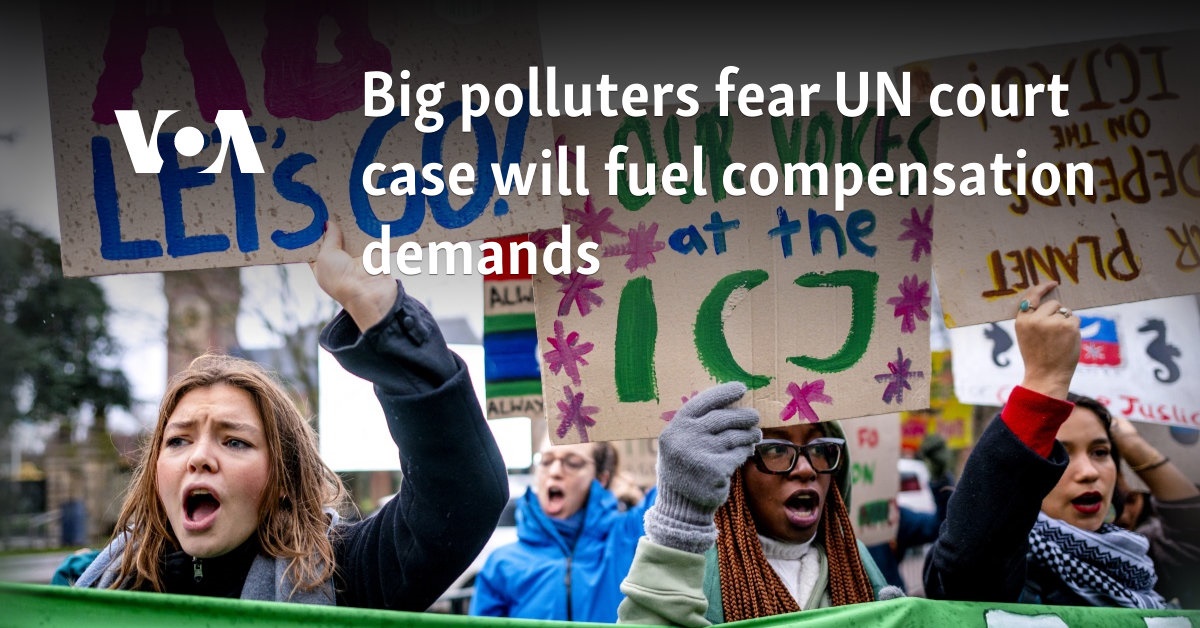As a landmark climate change case reached its halfway mark Friday at the International Court of Justice in The Hague, clear divisions have emerged over whether nation states can be held legally liable for global warming under international human rights laws.
The 15 judges at the United Nations’ top court have been asked to give an opinion on whether nation states are obliged under such laws to cut their greenhouse gas emissions and to address damage caused by climate change.
Existential threat
Small island and coastal states say their very existence is at stake due to rising sea levels. They argue that international human rights law must apply.
“Territories are disappearing. Livelihoods are being destroyed. Fundamental rights are being violated as we speak,” said Margaretha Wewerinke-Singh, the lead counsel for the Pacific Islands state of Vanuatu.
“The destruction of the Earth’s climate system and other parts of the environment constitutes grave breaches of international law. So, our hopeful expectation is that the court will recognize this and articulate the legal consequences of these violations,” she said.
“Legal consequences of violations of international law are always twofold. The wrongful conduct — the breaching conduct — must cease, it must be put to an end. And secondly, reparations must be made,” Wewerinke-Singh told reporters at The Hague at the opening of the hearing Monday.
Big polluters
However, the world’s biggest polluters — including the United States, China and India — argue that only global climate change agreements have any legal relevance. Human rights, they say, do not apply.
“In rendering its advisory opinion, the court may exercise due caution to avoid devising new or additional obligations beyond what is already agreed to under the existing climate change regime, which take into consideration historic emissions, climate justice and the principles of equity,” India’s representative, Luther Rangreji, told the court on Thursday.
Other major economies have made similar arguments during the first week of the hearing, according to analyst Elena Kosolapova of the International Institute for Sustainable Development.
“For example, Canada has argued that human rights obligations do not encompass the obligation to mitigate greenhouse gas emissions. Germany said the goal of human rights treaties is to protect actual victims of concrete violations and not abstract persons from abstract risks,” Kosolapova told VOA.
“Spain was a notable exception in this camp because it argued that governments actually have human rights obligations in relation to the response to climate change,” she said.
Reparations
Many developed nations fear the financial consequences if human rights laws are invoked, Kospolova said.
“Under the law of state responsibility, any breach of an international obligation, known as an ‘international wrongful act,’ entails certain consequences,” she said. “And many vulnerable countries have highlighted this during the hearings. The responsible state is obligated to make reparations for the injury caused by the wrongful act.”
Those reparations could take the form of compensation.
“Compensation was explicitly excluded from the loss and damage talks under the [climate change] convention and from the Paris Agreement itself,” Kospolova said. “So, I think it would be very interesting to see what the court has to say about it.”
Crucial year
The judges will hear another week of evidence before delivering their legal opinion next year, which is expected to be a crucial year for climate legislation. Over the next few months, nation states are due to publish action plans known as Nationally Determined Contributions, or NDCs, which outline how they plan to cut greenhouse gas emissions.
The NDCs will form a central part of the COP30 climate summit in November, to be held in the Brazilian city of Belem on the edge of the Amazon rainforest.







